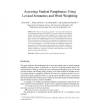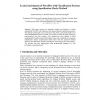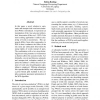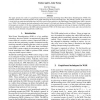34 search results - page 4 / 7 » Combining Unsupervised Lexical Knowledge Methods for Word Se... |
ACL
2010
13 years 5 months ago
2010
Word Sense Disambiguation remains one of the most complex problems facing computational linguists to date. In this paper we present a system that combines evidence from a monoling...
AIED
2009
Springer
14 years 2 months ago
2009
Springer
We present in this paper an approach to assessing student paraphrases in the intelligent tutoring system iSTART. The approach is based on measuring the semantic similarity between ...
NLDB
2001
Springer
14 years 8 days ago
2001
Springer
: This paper presents an automatic method and interface to enrich semantically WordNet with categories from general domain classification systems. The method is performed in two co...
EACL
2006
ACL Anthology
13 years 9 months ago
2006
ACL Anthology
In this paper a novel solution to automatic and unsupervised word sense induction (WSI) is introduced. It represents an instantiation of the `one sense per collocation' obser...
LREC
2008
13 years 9 months ago
2008
This paper presents the results of a graph-based method for performing knowledge-based Word Sense Disambiguation (WSD). The technique exploits the structural properties of the gra...




